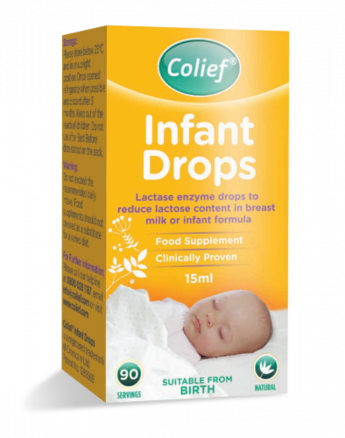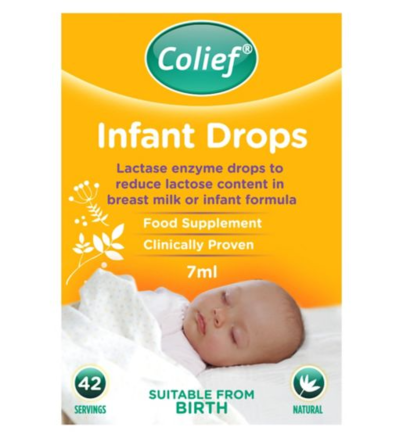Online Doctor
Colic
If your baby is suffering from colic, we understand the distress it can cause both you and your little one. That's why we're here to offer support and relief.
At Pharmacy Online, we understand the challenges that come with comforting a baby experiencing colic discomfort. That's why we're dedicated to providing safe and effective solutions for children's health needs, including trusted remedies for colic relief.
With our commitment to your child's well-being, you can trust that you're in good hands. Let's work together to help ease your baby's discomfort and bring peace to your home.
Shop colic treatment today for next day delivery
Understanding colic in babies
Colic can be a distressing experience for both babies and parents. Here's what you need to know:
What is colic?
Colic is defined as episodes of excessive crying or fussiness in an otherwise healthy and well-fed baby. These crying spells often occur for no apparent reason and can be intense and prolonged, lasting for hours at a time.
Common symptoms of colic
If your baby has colic, you may notice:
Intense and inconsolable crying: Your baby's crying spells may seem unrelenting, often peaking in the late afternoon or evening. These cries can be loud, frantic, and difficult to soothe.
Physical signs: Your baby may display physical signs of distress, such as clenched fists, tensed abdominal muscles, and a flushed face during episodes of crying. These outward signs of discomfort can be heart-wrenching for parents to witness.
Difficulty in calming down: Despite your best efforts to comfort them with rocking, swaddling, or feeding, your baby may struggle to calm down. Their cries may persist for hours, leaving you feeling helpless and exhausted.
Potential causes of colic
While the exact cause of colic remains unclear, several factors may contribute to it, including:
Gastrointestinal discomfort, such as gas, bloating, or indigestion, which can lead to discomfort and irritability.
Immature digestive or nervous systems make it challenging for babies to self-soothe and regulate their emotions.
Sensory sensitivities to environmental stimuli like noise, light, or changes in temperature, can overwhelm and overstimulate babies.
Effects on babies and parents
Colic can have a significant impact on both babies and parents:
Babies: Your baby may experience discomfort, irritability, and disrupted sleep patterns, leading to exhaustion and fatigue. Colic can also interfere with feeding, making mealtimes stressful for both you and your baby.
Parents: As a parent, witnessing your baby's distress can be emotionally draining and physically exhausting. Coping with prolonged crying spells can lead to increased stress, anxiety, and feelings of inadequacy.
Understanding the nature of colic and its effects can help you better cope with this challenging period. Remember, you're not alone, and there are strategies and support available to help you and your baby through this time.
What's the difference between normal crying and colic in babies?
Understanding why your baby is crying can be a big relief for any parent. Here's a simple guide to help you differentiate between normal crying and colic:
Duration and intensity: Normal crying usually stops when you address your baby’s immediate needs. In contrast, colic crying is intense, lasts for several hours, and happens regularly, often during the late afternoon or evening.
Predictability: A healthy baby cries at different times for various reasons. Colicky babies cry on a more predictable pattern, often described as the "rule of threes": for more than three hours a day, for more than three days a week, for at least three weeks.
Physical signs: While crying, a healthy baby generally looks comfortable once their needs are met. A colicky baby remains distressed despite your efforts to soothe them.
Response to comfort: Normal crying typically eases with comforting measures like feeding or cuddling. Colicky babies, however, may continue crying vigorously despite these attempts.
Treatment for colic
Finding relief for your baby's colic symptoms is a top priority, and Pharmacy Online is here to help with a range of effective treatments:
Infacol Colic Relief Drops
Infacol Colic Relief Drops are a popular choice for easing the discomfort associated with colic. Their gentle formula contains Simeticone, which works to break down gas bubbles in the digestive system, helping to alleviate the symptoms of trapped wind. Easy to administer, these drops can be given before each feed to help prevent colic episodes and keep your baby comfortable.
Colief Infant Drops
Colief Infant Drops are a gentle and natural remedy designed to ease the symptoms of colic in babies. Using an enzyme called lactase, Colief Infant Drops work to break down lactose in your baby's milk, making it easier for them to digest. This can help reduce the discomfort caused by lactose intolerance, which is a common contributor to colic symptoms.
Easy to use, simply add a few drops of Colief Infant Drops to your baby's milk before feeding. These drops are suitable for use from birth onwards and can be used with both breast milk and formula.
Shop colic treatment today for next day delivery
When to consult a doctor
While infant colic is a common condition that usually resolves on its own, certain signs may indicate a need for medical attention. It's important to consult your baby's healthcare provider if:
- Your baby's crying is accompanied by fever, vomiting, or diarrhoea.
- Your baby is not gaining weight or is experiencing feeding difficulties.
- Your baby's cries are unusually high-pitched or continuous.
- Your baby's abdomen appears swollen or distended.
- You are concerned about your baby's well-being or if your baby's cry is causing significant distress for you or your family.
Your health visitor can assess your baby's symptoms and guide the best course of action. Don't hesitate to reach out if you have any concerns about your baby's health or well-being.
Always trust your instincts as a parent; if something seems off, it's best to consult a healthcare professional.
How to choose the right medication?
Selecting the most suitable product for your colicky baby requires careful consideration of their unique needs and preferences:
Identify symptoms: Keep a note of your baby's specific colic symptoms, such as prolonged crying, irritability, and trouble settling down. Since various products target different issues, selecting one that addresses your baby's particular symptoms is vital.
Examine ingredients: Read the ingredients list of each product to make sure they're safe and appropriate for your baby’s age and overall health. Choose products with gentle, natural components that alleviate colic symptoms without negative side effects.
Read reviews and seek recommendations: Spend time reading product reviews and asking for advice from other parents or healthcare professionals. Learning from the experiences of others can guide you to make a well-informed choice and discover the most effective solution for your baby.
Consult a healthcare professional: If you're uncertain about which product to choose, or if your baby’s colic symptoms continue, consult with a doctor or your healthcare provider.
Buy Colic medicine from Pharmacy Online
Don't let colic discomfort prolong your baby's distress. Shop our range of colic relief products and give your baby the comfort they deserve. Order today for quick, reliable delivery right to your doorstep!
Shop colic treatment today for next day delivery
Colief Infant Drops - 15ml In stock
From £14.99Colief Infant Drops - 7ml In stock
From £8.99Infacol Oral Suspension 55ml In stock
From £4.59
FAQ
What foods should I avoid if I'm breastfeeding a baby with colic?
Some foods might irritate a colicky baby when consumed by breastfeeding mothers. Common potentially irritating foods include dairy products, caffeine, onions, cabbage, and spicy foods. It’s advisable to keep a food diary to identify potential triggers.
How can keeping the baby upright help with colic?
Holding your baby upright during and after feedings can help reduce colic symptoms by minimising acid reflux and aiding in digestion. This position can also provide comfort and reduce crying episodes.
What are some effective ways to manage colic symptoms?
Managing colic symptoms can include using a pacifier, implementing a consistent soothing routine, and trying different motions such as gentle rocking or swaying. Additionally, ensuring a quiet and calming environment may help.
How can I provide comfort to my colicky baby?
Providing comfort can involve swaddling your baby to mimic the security of the womb, using a white noise machine or your vacuum cleaner or soft music to soothe them, and offering a warm bath to help relax their muscles.
Practical tips include:
- Using a baby or infant swing or bouncer to provide gentle, rhythmic motion.
- Trying a "colic carry," where the baby lies face down on your forearm.
- Gently massaging the baby’s back or belly.
- Take your baby for a car ride or walk in the pram, as the motion can be calming.
Should I use colic drops or gripe water?
Colic drops and gripe water can sometimes provide relief for colic symptoms. However, it’s essential to choose products carefully and consult with a healthcare provider before using them to ensure they are safe for your baby.








